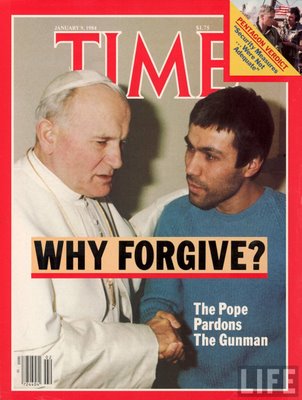One of the more beautiful and admirable attributes of the saints-but also one that can be a bit dangerous if we are not careful-is their remarkable willingness and even desire to forgive and make excuses for those who cause them harm.

I say beautiful and admirable because it is an imitation of Jesus Christ who, as he experienced the agony of the cross, prayed, “Father, forgive them; for they know not what they do” (Luke 23:34). However plain it seems to us that these persons knew precisely what they were doing, Christ challenges us in our perceptions and cautions us not to judge the intentions we can never fully know. He makes excuses for them and expresses, even in the midst of his suffering, the desire that they be forgiven.
But at the same time, to make excuses for those who do evil can be dangerous. It can allow for its continuation and perpetuate the sin. Psychologists speak of codependency and the consequences of enabling others to continue in their destructive behavior. Certainly Christ is not advocating that. It is a careful balance we must strike, because we believe in a God of unfathomable mercy but also in a God of justice.
A wonderful, and I would say also timely, example for us in this careful balance between forgiveness and justice is Blessed John Paul II (soon to be canonized St. John Paul II). Shot at point blank range in St. Peter’s square in 1981, he nearly died from that assassination attempt. Yet once he had recovered enough to speak he broadcast a message to the entire world: “I pray for that brother of ours who shot me, and whom I have sincerely pardoned.”
That brother of ours? By no means was Blessed John Paul II referring here to the fraternal bond of baptism. The assassin, Mehmet Ali Ajca, was not a Christian. The Pope was simply referring to this person’s dignity as one created in the image of God and, in a certain sense, making excuses by separating the man from the act of destruction he had so deliberately carried out. What is often missed in John Paul’s offer of forgiveness and his subsequent pastoral visit to “this brother of ours” is the fact that Blessed John Paul II was in total agreement that Ajca, who had already taken the life of a journalist, be locked up in jail!
We believe in forgiveness and mercy, but also that dangerous criminals should be kept off the streets. We are not blind to the fact that those who have committed heinous crimes owe a debt to society; their acts of violence have penal ramifications.
Why do I mention these things this morning? Firstly, they are important for us to reflect on because every single one of us, at one time or another, has been hurt by the words or actions of others. What does forgiveness mean for us, and how should we pursue it? On a broader level, as recent as this morning our newspapers display criminals who have committed acts of violence against innocent people; the call for justice, even retribution, echoes from the radio and television news stations daily. As Christians we are called to embrace forgiveness and mercy but by no means are we to forget the demands of justice and the responsibility to make the world a safer place. It is not easy to discern how we should respond to the demands of the Gospel, which Christ and saints like John Paul II have modeled so well for us. In our first reading this morning, however, the patriarch Joseph teaches us beautifully how to begin.

